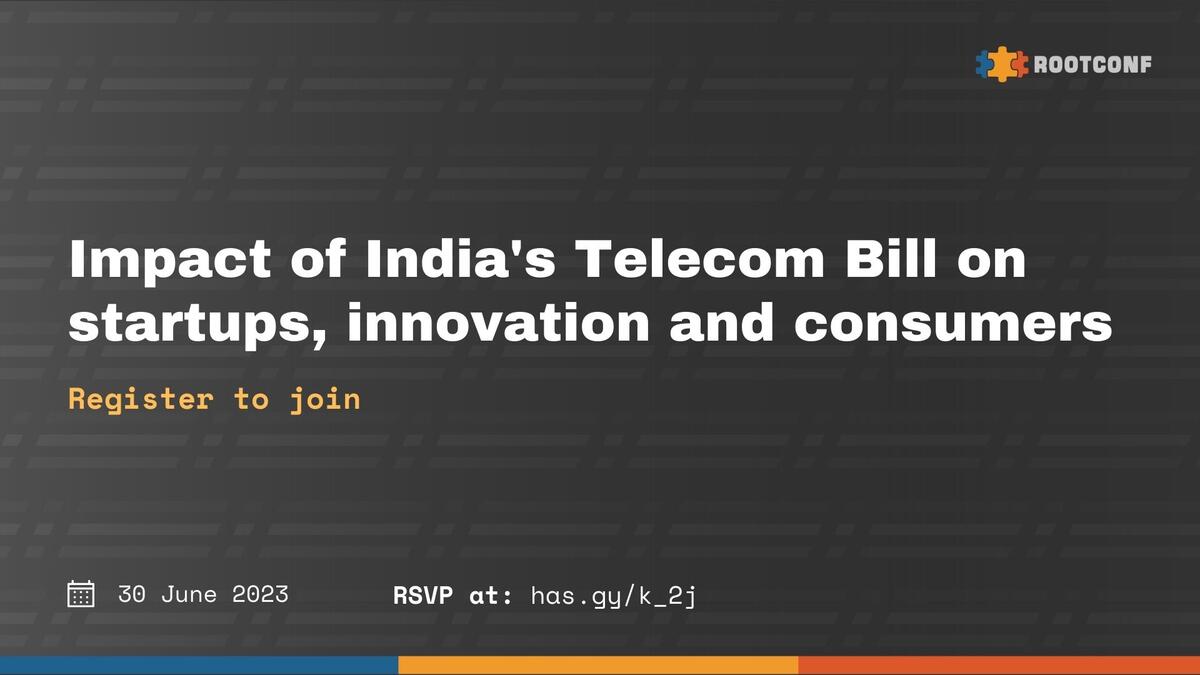Context of the Draft Telecom Bill - Key Issues & Concerns
The draft Telecom BIll, published by the Indian government in September 2022, aims to bring significant changes to the telecom sector by replacing outdated laws, including the century-old Indian Telegraph Act of 1885. The telecom bill is expected to be introduced in the upcoming monsoon session of Parliament, and is likely to have a significant impact on businesses and consumers if adopted in its current form.
The bill deals with several key issues, including licensing norms, spectrum allocation, consumer protection and surveillance. Some of the key proposals include:
- A mandatory licensing regime that would include communication services like Whatsapp, Signal and Telegram; video conferencing applications like Skype, Zoom and Google Meet; M2M services including IoT applications; media and broadcasting; and other data-led services.
- An extension of the government’s broad powers to intercept and monitor messages and to suspend telecom services in the case of public emergencies or threats to public safety.
- Promoting infrastructure development and domestic manufacturing in the telecom sector through R&D activities, and streamlining the spectrum allocation process
- Strengthening the consumer protection framework by imposing strict regulations on service quality and introducing grievance redressal mechanisms
Some of these proposals raise serious concerns with respect to consumer privacy, ease of doing business and the overall impact on innovation.
Keeping this in mind, Hasgeek aims to foster greater engagement between policymakers and the technology community with a series of deliberations on the bill.
Why it is important to engage on this issue
The telecom industry is experiencing significant changes driven by technologies such as 5G, IoT, and AI, enabling innovative services and new business models. Telcos are diversifying into content and payments, while startups are entering sectors like agriculture and healthcare. An effective telecom bill is crucial to capitalise on these opportunities, incentivise innovation, and maintain operational efficiency.
However, the draft telecom bill raises serious concerns. It could increase costs for telecom operators and startups, hinder access to affordable services, and impede progress towards universal access goals. Moreover, the draft bill compromises user privacy. It expands government surveillance powers, introduces new identity verification norms, and weakens privacy rights. Additionally, the bill allows for arbitrary internet shutdowns during emergencies, without adequate safeguards.
To ensure a thriving telecom sector, it is essential to strike a balance between regulatory oversight and safeguarding user rights. For this to happen, policymakers, the technology community, users and civil society need to have a deeper dialogue on the proposed telecom bill.
Who should attend this discussion?
- Startup teams building products across the infrastructure, application and services layers
- Investors tracking the telecom, IT and media sectors in India
- Individual consumers who will be directly affected if the bill is adopted
- Civil society actors engaged in defending the rights of users
- Think tanks developing a research agenda on these issues
- Policymakers including government officials and regulators in the telecom sector
- Lawyers and policy advisors advising clients on the impact of the bill
Key outcomes for participants
- An introduction to key concepts and concerns in the bill, followed by a discussion with experts
- Understand the second-order effects of the bill for businesses and consumers based on a presentation by Aapti Institute, an organisation that has developed a detailed report on this issue
- Join a forum for policymakers, startups and consumers to engage with each other on these issues
Agenda & Speakers
The online event on 30th June will be conducted as follows:
- Context setting discussion between Parag Kar (ex-VP, Qualcomm India) and Amlan Mohanty (Lawyer & tech policy advisor) for 20 minutes
- Report briefing by Aapti Institute by Kunal Raj Barua and Mousomi Panda for 15 minutes
- Panel discussion on the impact of India’s Telecom Bill on startups, innovation and consumers between Mahesh Uppal (Telecom policy consultant), Sunil Bajpai (Chief Trust Officer, Tanla Platforms), Gurumurthy Konduri (Ozonetel), Arnav Gupta (former Editor of Fragments and DroidconIN on hasgeek.com), and Anushka Jain (Internet Freedom Foundation). The discussion will be moderated by Amlan Mohanty and will last 45 minutes.
Contact information: For queries about the meetups, contact Hasgeek at support@hasgeek.com or call (91)7676332020.
Purchase a membership to support Rootconf’s community activities on hasgeek.com




